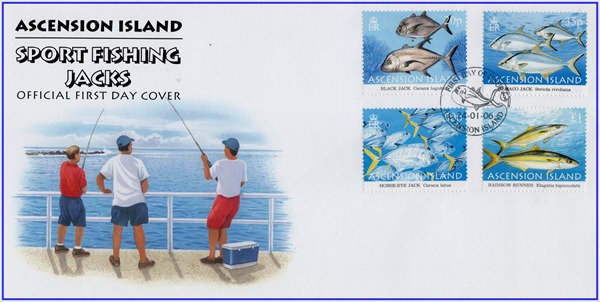
Sport fishing is fishing for pleasure or competition.The most common form of recreational fishing is done with a rod, reel, line, hooks and any one of a wide range of baits. The most common salt water game fish are marlin, tuna, tarpon, sailfish, shark, and mackerel.
In order to protect recreational fisheries sport fishermen now often catch and release, and sometimes tag and release, which involves fitting the fish with identity tags, recording vital statistics, and sending a record to a government agency.
The Postal Administrative of Ascension Island has issued a stamp series consist of four single stamps feature sport fishing jacks, Black Jack (Caranx lugubris), Almaco jack (Seriola rivoliana), Horse-eye jack (Caranx latus), Rainbow runner (Elagatis bipinnulata). The First Day Cover have presented picture of three sport-fishermen and the Cancellation postmark figured a jack fish with black colour dated January 24, 2006.

Almaco jack's unusual stamina makes them a prime target for deep sea fishermen. The Almaco jack is a pelagic species that can be found in small groups on slopes and off of reefs at depths from 5 to 160 metres
The Black jacks are of high importance to many island fisheries, but are rarely encountered in most continental fisheries. The species has a reputation as a gamefish, and is variably considered a terrible or excellent food fish.
The horse-eye jack, Caranx latus, is a gamefish and minor commercial fish in the family Carangidae. It is also known as the big-eye jack. In the eastern Atlantic, the horse-eye jack is found from St. Paul's Rocks to Ascension Island and, rarely, the in the Gulf of Guinea. It is a pelagic fish.
The rainbow runner (Elagatis bipinnulata), is a common species of pelagic marine fish of the jack family, Carangidae. The species is widespread throughout the tropical and subtropical waters of the world, inhabiting both coastal as well as far offshore areas.

No comments:
Post a Comment